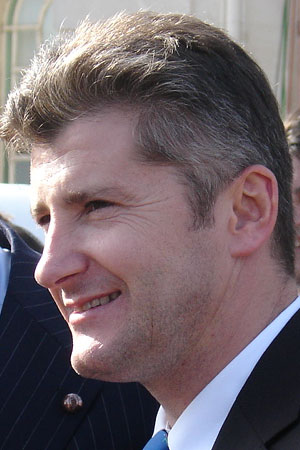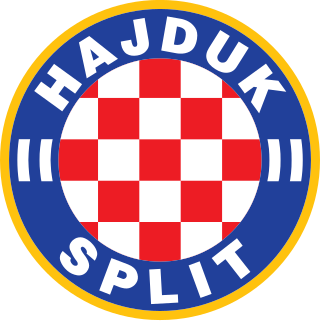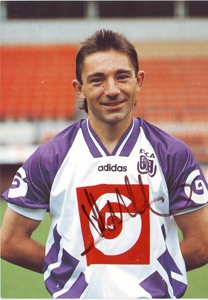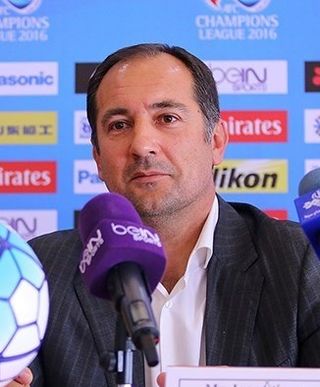Related Research Articles

Davor Šuker is a Croatian football administrator and former professional player who played as a striker. He served as the president of the Croatian Football Federation from 2012 to 2021. As Croatia's all-time top scorer with 45 goals, Šuker is generally regarded as the greatest Croatian striker of all time, and as one of the greatest strikers of all time.

Hrvatski nogometni klub Hajduk Split, commonly referred to as Hajduk Split or simply Hajduk, is a Croatian professional football club based in Split, that competes in the Croatian First League, the top tier in Croatian football. Since 1979, the club's home ground has been the 33,987-seater Stadion Poljud. The team's traditional home colours are white shirts with blue shorts and blue socks.

The Serbia men's national football team represents Serbia in men's international football competition. It is controlled by the Football Association of Serbia, the governing body for football in Serbia.

Vahid Halilhodžić is a Bosnian professional football manager and former player. He is regarded as one of the most controversially successful Bosnian football managers, due to his successful tenure in coaching various national teams yet having problematic relations with his teams and players due to different approaches.
Robert Jarni is a Croatian former professional footballer who played as a left winger or wingback.

Dražen Ladić is a Croatian professional football coach and former player who is the current assistant manager of the Croatia national team.

Josip Weber, nicknamed Joske, was a professional footballer who played as a forward. He represented Croatia and Belgium at international level.

Zlatko "Cico" Kranjčar was a Croatian professional football manager and player.

The Croatia national handball team represents Croatia in international men's team handball competitions and friendly matches. The handball team is controlled by the Croatian Handball Federation (HRS).

Zlatko "Čik" Čajkovski was a Croatian football player and coach. His brother, Željko Čajkovski, was a footballer as well. Normally a defensive midfielder, Čajkovski was renowned for his tremendous physical condition and marking ability and is considered to be one of the finest Yugoslav footballers. Despite his normally defensive role he was also a fine passer and possessed top-class technical ability.
Dražan Jerković was a Yugoslav and Croatian professional football manager and player. A forward, his professional playing career spanned from 1954 to 1966, during which he played for Dinamo Zagreb and AA La Gantoise.
The Serbia and Montenegro national football team was a national football team that represented the State Union of Serbia and Montenegro. It was controlled by the Football Association of Serbia and Montenegro. For 11 years, it was known as the FR Yugoslavia national football team when the state was called the Federal Republic of Yugoslavia, until February 2003, when the name of the country was changed to Serbia and Montenegro. In 2006, Montenegro declared its independence from Serbia, with the result that the country's football team was renamed as the Serbia national football team on 28 June 2006 with the Montenegro national football team created to represent the renewed state of Montenegro.
Franjo Glaser was a Croatian football goalkeeper and football manager. He is the only Yugoslav footballer who won national titles before and after the Second World War, with three clubs BSK Belgrade, Građanski Zagreb and FK Partizan.

Igor Štimac is a Croatian professional football manager and former player. He is currently coaching the India national football team.
Vladan "Vlado" Čapljić is a Bosnian professional football manager and former player.

The North Macedonia men's national basketball team represents North Macedonia in international basketball and is controlled by the Basketball Federation of North Macedonia. They joined FIBA in 1993, after they gained independence from Yugoslavia. That same year the national team played their first official match against Estonia. Prior to 1993, Macedonian players took part on the Yugoslavia national team.
August Lešnik was a Croatian footballer. Lešnik played most of his club football for Građanski Zagreb. In 1941 he was the Croatian First League's top scorer while playing for Građanski, and performed the same feat twice in the Yugoslavian First League as well: in 1938 and 1939. He played for the Yugoslavian football team in the late 1930s and the Croatia national team from 1940 to 1944.
Florijan Matekalo was a footballer who played international football for both Yugoslavia and Croatia.
Gustav Lechner was a football player and coach. At international level he represented both the Yugoslavian and Croatian national sides.
Ratko Kacian was a Croatian footballer. He played internationally for the Croatia national team from 1940 to 1943 and with Yugoslavia's national team in 1946. He was also part of Yugoslavia's squad for the football tournament at the 1948 Summer Olympics, but he did not play in any matches.
References
- ↑ "German scandal raises echoes of the past". Daily Times. 9 February 2005. Retrieved 26 February 2012.
- ↑ "Players Appearing for Two or More Countries". RSSSF . Retrieved 28 June 2014.
- ↑ "Player Database". EU-football. Retrieved 18 September 2022.